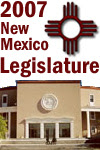 Here we go again: A group of lawmakers are continuing their quest to open legislative conference committees to the public.
Here we go again: A group of lawmakers are continuing their quest to open legislative conference committees to the public.
Such a change is necessary to help weed out the culture of corruption in state government. Such a change isn’t likely to happen anytime soon.
But we can always hope.
This year, Rep. Joseph Cervantes, D-Las Cruces, Sen. Dede Feldman, D-Albuquerque, and Sen. Joe Carraro, R-Albuquerque, have all introduced bills to open conference committees to the public. They’re joined this year by a new tactic from House Republicans.
Rep. Dan Foley, R-Roswell and the minority whip, has sponsored House Resolution 2, which would create a rule preventing members from participating in closed conference committees. The bill is supported by the entire Republican caucus, he says, but it needs support of two-thirds of House members.
That’s not likely.
Last year, a very bipartisan group of senators voted to kill Feldman’s proposal to open conference committees. The House didn’t even vote on the issue after Speaker Ben Lujan gave it the kiss of death by assigning Cervantes’ bill to three committees before it could move to a floor vote.
In a 30-day session, there’s no way that could happen.
How did
Sens. Mary Jane Garcia, D-Doña Ana, and Cynthia Nava, D-Las Cruces, who voted against opening conference committees in 2003, voted in favor of doing so in 2006. Sen. Mary Kay Papen, D-Las Cruces, voted in favor of opening them in 2003 and in a committee hearing in 2006, but was absent for last year’s Senate floor vote.
Sen. Leonard “Lee” Rawson, R-Las Cruces, voted in favor of opening conference committees in 2003 but against doing so last year. Sen. Dianna Duran, R-Tularosa, voted both years to open conference committees.
Why is it so important that conference committees be open to the public?
Some of the most impactful decisions come in conference committees, and are currently made by a handful of lawmakers in secret.
Cervantes has said he believes much of the opposition to opening conference committees comes not only because legislative leaders want to shut out the public, but also because they want to keep other lawmakers in the dark.
The best way to ensure our lawmakers are making decisions that are in the best interest of the residents of the state is by letting the residents of the state, and the media, and other lawmakers, watch them make those decisions. Given the recent scandals that have plagued state government, the public has every reason to be suspicious of the actions and motives of its elected leaders.